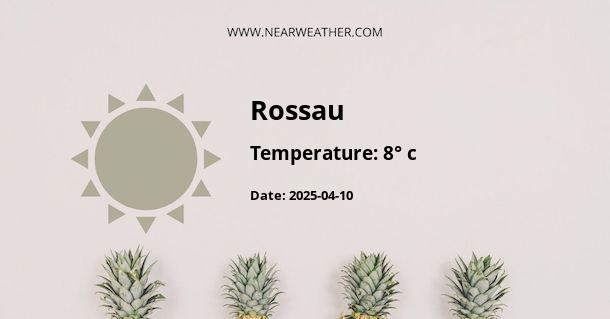Rossau Weather Today
Daily Weather Forecast & Temperature in Rossau
Sun & Moon
Location Info
Embed This Weather
The Climate and Weather of Rossau, Germany
The quaint municipality of Rossau is situated in Central Germany, within the federal state of Saxony. The town experiences a temperate climate year-round, with distinct seasons that appeal to locals and visitors alike. Understanding the detailed meteorological patterns of Rossau can aid in planning agricultural activities, travel plans, and daily life for the residents. Below is a comprehensive examination of Rossau's climate, complete with statistical data and expert analysis.
Seasonal Weather Overview
Rossau's climate falls within the Köppen climate classification as Cfb, which denotes a temperate oceanic climate. The region is characterized by moderate variability in temperature and significant precipitation throughout the year.
Spring (March - May)
- Temperature: Spring sees a gradual rise in temperature from an average low of 0°C to a comfortable high of 15°C by the end of May.
- Precipitation: Average precipitation ranges from 40-55mm per month, with occasional rain showers.
- Weather Phenomena: Late frosts are possible, making it vital for agriculture to heed frost warnings.
Summer (June - August)
- Temperature: Summer months are warm with average highs reaching up to 24°C, and nighttime lows rarely dipping below 12°C.
- Precipitation: Summer is the wettest season, with monthly rainfall peaking at around 80mm in June. Thunderstorms are common due to the higher temperatures and moisture.
- Weather Phenomena: Heatwaves can occur but are typically brief.
Autumn (September - November)
- Temperature: Autumn experiences a steady decline in temperature, from highs of 19°C in September to chilly lows of 2°C in November.
- Precipitation: The rainfall lessens compared to summer, averaging 45-50mm per month.
- Weather Phenomena: Morning mists and early frosts become more frequent as the season progresses.
Winter (December - February)
- Temperature: Winter is cold, with temperatures ranging from -2°C to 3°C. Sub-zero temperatures at night can lead to frosts and icy conditions.
- Precipitation: Snowfall is intermittent, with monthly averages at 40mm equivalent precipitation.
- Weather Phenomena: Snow cover is not persistent, but cold waves can bring extended periods of sub-freezing temperatures.
Temperature Patterns
According to historical meteorological data, the warmest month in Rossau is usually July, with an average maximum temperature of 24°C. Conversely, the coldest month is typically January, with an average minimum temperature of -3°C.
Precipitation Patterns
Annual precipitation in Rossau averages at about 600-700mm. The region does not have a dry season, instead, precipitation is spread relatively evenly across all months, with a peak during the summer due to thunderstorm activity.
Table of Average Monthly Temperatures and Precipitation
| Month | Average High (°C) | Average Low (°C) | Average Precipitation (mm) |
|---|---|---|---|
| January | 2 | -3 | 40 |
| February | 3 | -2 | 35 |
| March | 8 | 0 | 40 |
| April | 13 | 3 | 45 |
| May | 18 | 8 | 55 |
| June | 21 | 11 | 70 |
| July | 24 | 13 | 80 |
| August | 23 | 13 | 60 |
| September | 19 | 10 | 45 |
| October | 14 | 6 | 40 |
| November | 7 | 2 | 50 |
| December | 3 | -1 | 45 |
Wind and Sunlight Patterns
Wind in Rossau is generally moderate throughout the year, with westerly winds being most common due to the influence of Atlantic depressions. However, during the winter, easterly winds can dominate, bringing colder, continental air from the east. Rossau enjoys a moderate amount of sunshine, with the summer months offering the longest hours of daylight – up to 16 hours in June.
Climate Change Implications for Rossau
Like many regions worldwide, Rossau's climate is influenced by the broader implications of climate change. Localized effects may include alterations in precipitation patterns, increased frequency of extreme weather events, and shifts in seasonal norms.
Extremes and Variability
Recent studies suggest a trend toward warmer temperatures, which could lead to more significant fluctuations between the seasons and more frequent heatwaves. Additionally, a potential increase in the intensity and frequency of rainfall may pose challenges to stormwater management and agricultural practices.
Adaptation and Resilience Measures
Adaptation strategies in response to climate change include improving the efficiency of water use, implementing flood defenses, and enhancing biodiversity. It is crucial for local policymakers to integrate climate projections into urban planning and infrastructure development to mitigate future risks associated with climate change.
Conclusion
Rossau's climate is marked by its temperate characteristics, offering a balanced range of weather that supports a healthy ecosystem and diverse human activities. While it enjoys the typical weather patterns of four distinct seasons, there is an imperative to monitor and adapt to any shifts that may be influenced by the wider trend of global climate change. Preparing for such eventualities will ensure the sustainability and resilience of Rossau's environment and community well into the future.
What is the Latitude and Longitude of Rossau?
Rossau's Latitude is 51.000000 & Longitude is 13.066670.
What is the weather in Rossau today?
Weather in Rossau is 1° today.
What is the climatic condition of Rossau today?
Climate Conditions in Rossau shows light snow today.
What is the humidity in Rossau today?
Humidity in Rossau is 95% today.
What is the wind speed in Rossau today?
Wind speed in Rossau is 18.4 km/h, flowing at 276° W wind direction.
What does it feel like in Rossau today?
It feels like -4° in Rossau today, with 100% cloud cover and 44 m visibility.
